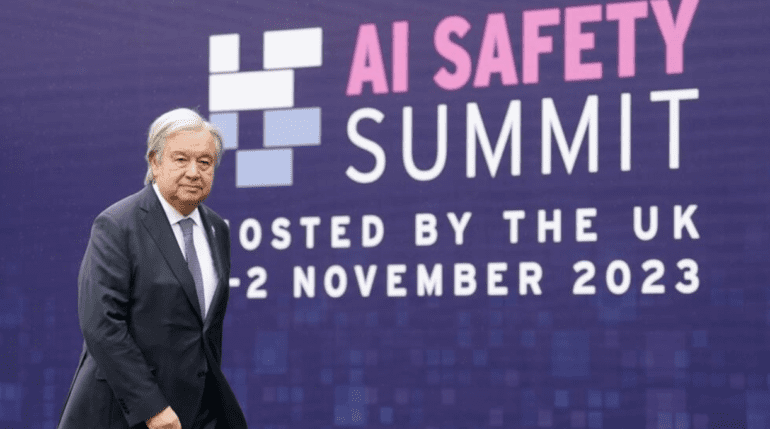TL;DR:
- UN Secretary-General António Guterres emphasizes the need for global cooperation in addressing AI’s potential challenges.
- The inaugural AI Safety Summit saw 28 countries and the EU sign an agreement acknowledging the necessity of international action.
- UK Prime Minister Rishi Sunak and US Vice President Kamala Harris attend, highlighting the significance of the event.
- Guterres warns of AI’s potential long-term negative consequences on jobs, culture, and geopolitical tensions.
- Calls for a united, sustained, global strategy based on established principles.
- The release of generative AI systems like ChatGPT sparks public interest but also concerns about job displacement and cyberattacks.
- UK plans state-backed testing and evaluation of advanced AI models, with London and Washington taking similar steps.
- US efforts to distinguish authentic content from AI-generated content and prevent discriminatory AI algorithms.
- Elon Musk attends and highlights AI as an existential risk.
- European leaders call for an innovation-friendly approach to AI regulation.
- International collaboration and strategic planning are crucial in navigating AI’s impact.
Main AI News:
In the fast-paced world of artificial intelligence, UN Secretary-General António Guterres has sounded the alarm, urging nations to unite in confronting the imminent challenges posed by AI technology. Speaking at the inaugural AI Safety Summit held at Bletchley Park, just north of London, Guterres emphasized the need for proactive measures to stay ahead of the AI wave.
The summit kicked off with a landmark agreement, signed by 28 countries and the European Union, acknowledging the necessity of international cooperation in addressing AI’s profound implications. However, it was on the second day that senior representatives from leading nations gathered to deliberate on AI’s most pressing threats. Prominent figures like UK Prime Minister Rishi Sunak and US Vice President Kamala Harris were in attendance, underlining the significance of this momentous event.
Joining the discussions were Italian Prime Minister Giorgia Meloni and EU chief Ursula von der Leyen, along with government officials from France, Germany, Australia, and other nations. The tech industry was also well-represented, with visionaries like Elon Musk lending their expertise.
Guterres issued a stark warning about AI’s potential “long-term negative consequences” on various facets of society, from employment to culture. He expressed concerns about the concentration of AI power in a few countries and companies, which could exacerbate geopolitical tensions. Furthermore, he cautioned that AI could widen existing global inequalities.
The UN chief called for a “united, sustained, global strategy” based on principles laid out in the organization’s 1945 charter and the Universal Declaration of Human Rights. In an era where AI is rapidly reshaping the world, it is imperative that nations work together to harness its potential while mitigating its risks.
The release of generative AI systems like ChatGPT has captured the public’s imagination, offering a glimpse into the transformative power of AI. However, it has also raised concerns about job displacement, cyberattacks, and human control over these systems.
UK Prime Minister Rishi Sunak has been vocal about AI’s potential to reshape society for generations to come. He is advocating for a global approach to address AI risks and seize its opportunities. Sunak’s office is pushing for state-backed testing and evaluation of advanced AI models before their release, a concept London and Washington have both embraced this week.
US Vice President Kamala Harris outlined US efforts to distinguish authentic government-produced digital content from AI-generated content and prevent the use of discriminatory AI algorithms. As the late Stephen Hawking once remarked, AI could be the best or worst thing to happen to humanity. The summit participants hope to steer AI’s course toward the former by fostering international collaboration.
UK Foreign Secretary James Cleverly stressed the urgency of a coordinated response to AI’s rapid advancement. Governments and the commercial sector alike are recognizing the need to act swiftly to keep pace with evolving technology.
While China participated in the summit on its first day, it was not present for the more sensitive discussions held behind closed doors on the second day. These discussions involved academia, civil society, and leading AI companies like OpenAI, Anthropic, Google DeepMind, and Microsoft.
Elon Musk, CEO of SpaceX and Tesla, attended both days of the summit and described it as “timely.” He emphasized that AI represents one of the most pressing existential risks due to its rapid rate of advancement.
In Rome, ministers from Italy, Germany, and France called for an “innovation-friendly approach” to AI regulation in Europe, emphasizing the need for increased investment to compete with the United States and China in the AI arena.
Conclusion:
The UN Chief’s call for a unified global response to AI threats at the UK Summit underscores the growing recognition of AI’s transformative potential and risks. This signifies that the market will likely see increased efforts by governments and businesses to collaborate on AI regulation, testing, and evaluation, with a focus on minimizing negative consequences while maximizing opportunities. Expect heightened attention to AI’s societal impact and the need for responsible development and deployment.

